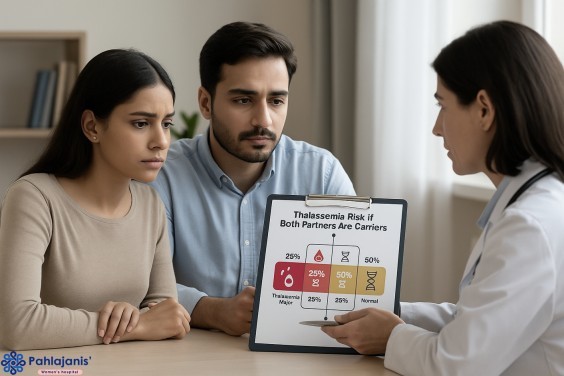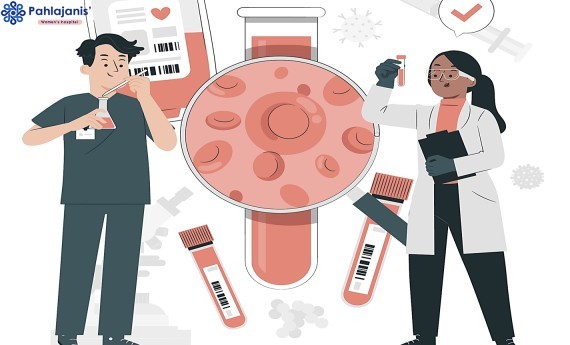Are you or your partner a Thalassemia Minor? Are both of you planning marriage or having a baby?
If you or your partner carries Thalassemia Minor, your future child could face life-threatening health challenges. The good news? Modern science offers powerful solutions to prevent Thalassemia Major. In this comprehensive guide, we break down expert insights from Dr. Neeraj Pahlajani, a leading Infertility & High-Risk Pregnancy Specialist.
In this blog, we will explain:
- What Thalassemia is
- Why testing is important
- What problems may happen if both partners are carriers
- And most importantly, how science can help you have a healthy baby
This blog is based on expert advice from Dr. Neeraj Pahlajani, a specialist in IVF and high-risk pregnancy.
Watch Full YouTube Video: https://youtu.be/MHdwccCiSqI
What is Thalassemia?
Thalassemia is a disease that affects your blood. It is passed from parents to children through genes. People with this condition have less hemoglobin in their blood, which carries oxygen in the body.
There are two types: 
- Thalassemia Minor (The “Carrier”): If you have Thalassemia Minor, you’re a “carrier.” You likely feel completely healthy – maybe you didn’t even know you had it! Carriers have slightly less healthy red blood cells, but it doesn’t affect daily life. The onlyrisk? If your partner is also a carrier, it can pass to your children.
- Thalassemia Major (The Serious Illness): Babies born with Thalassemia Major face lifelong struggles. They need blood transfusions every 3-4 weeksjust to survive. Without these, they become very weak. Treatment costs ₹3-5 lakhs per year – like buying a new car annually. Sadly, most don’t live beyond age 30 due to heart or liver damage.
Key Fact: Thalassemia is inherited like eye color – passed from parents to children through genes.
What If Both Partners Have Thalassemia Minor?
If both husband and wife have Thalassemia Minor, there is a 25% chance (1 in 4) that their baby may be born with Thalassemia Major.
If both parents carry Thalassemia Minor, genetics work like this:
- 25% chance: Baby is healthy (normal genes).
- 50% chance: Baby is a carrier like parents (no health issues).
- 25% chance: Baby has Thalassemia Major (serious illness).
Think of it like tossing coins:
If you toss two coins at once, there’s a 25% chance both land “tails” (Thalassemia Major). But with medical help, you can avoid tossing the coins altogether.
What Happens to a Baby with Thalassemia Major?
A child with Thalassemia Major cannot make enough healthy blood. This causes:
- Extreme weakness
- Pale skin
- Swelling of the stomach due to liver and spleen enlargement
- Slow growth
- The child needs blood transfusions for life
Also, repeated transfusions cause iron overload, which harms the heart, liver, and other parts of the body.
This makes life very hard for the child and the parents.
Can Thalassemia Major Be Cured?
The only possible cure is a Bone Marrow Transplant (BMT). But this:
- Is very expensive
- Needs a perfect match
- Has many risks
For most families, BMT is not possible. That’s why the best solution is to prevent the disease before the baby is born.
Why Should You Get Tested Before Marriage or Pregnancy?
A simple blood test can tell you if you are a Thalassemia Minor carrier. It’s called HPLC test or Hemoglobin Electrophoresis.
If only one partner is a carrier – no problem. If both are carriers – there is a risk to the baby.
That’s why it’s very important to get tested before marriage or pregnancy.
How IVF with PGD Can Help?
Modern science gives us a way to stop Thalassemia Major even if both parents are carriers. This is possible through:
- IVF (“Test-Tube Baby”):
- Doctors collect eggs from the mother and sperm from the father.
- They combine them in a lab to create embryos (early-stage babies).
- PGD (Genetic “Quality Check”):
- When embryos are 5 days old, scientists remove a few cells.
- They check the DNA for Thalassemia genes – like scanning a barcode.
- Only healthy embryos(without Thalassemia Major) are placed in the mother’s womb.
Results: Near 100% chance of a healthy baby! Only the healthy embryos (not having Thalassemia Major) are placed in the mother’s womb. This way, you can have a Thalassemia-free baby.
This treatment is available at advanced fertility centers like Pahlajanis’ IVF Center – Raipur, Bhilai & Bilaspur, led by Dr. Neeraj Pahlajani.
What If You’re Already Pregnant?
Don’t panic! You still have options:
- CVS Test (10-13 weeks): Doctors take a tiny piece of the placenta (afterbirth) with a needle. It’s tested for Thalassemia genes. Result in 1-2 weeks.
- Amniocentesis (15-20 weeks): Doctors take a spoonful of fluid around the baby. Safer than CVS, but done later.
If the baby has Thalassemia Major:
- You can legally end the pregnancy before 24 weeks in India.
- NGOs like Thalassemics Indiaprovide free counseling for couples.
What If You Are Already Married?
If you are already married and both of you have Thalassemia Minor:
- Do IVF with PGD to avoid risk
- Or do CVS/Amniocentesis in early pregnancy
- You can also consider donor sperm or egg to avoid the faulty gene
You still have many ways to have a healthy baby.
What Are Donor Sperm or Donor Egg Options?
If both partners are Thalassemia carriers, using donor sperm or egg is one more safe option.
Doctors use sperm or eggs from healthy donors who are not carriers. This ensures that the baby will not get Thalassemia Major.
Many couples choose this option and go on to have healthy children.
Final Words: Science Se Solution Hai
Good news is — today we have solutions. You can avoid Thalassemia Major and have a healthy baby by:
- Doing a simple Thalassemia test
- IVF with PGD
- Prenatal testing like CVS or Amniocentesis
- Using donor sperm or egg if needed
- Medical abortion (legal up to 24 weeks) if the fetus has Thalassemia Major
Talk to an expert like Dr. Neeraj Pahlajani and plan a safe and happy pregnancy.
Frequently Asked Questions (FAQs)
- What is Thalassemia?
Thalassemia is a blood problem passed from parents to children. People with it have less hemoglobin, which carries oxygen in the body.
- What is the difference between Thalassemia Minor and Major?
- Minor: You are a carrier. You are healthy or may have mild anemia.
- Major: A serious condition. You need regular blood transfusions to live.
- How can I know if I have Thalassemia Minor?
A simple blood test like HPLC can tell if you are a carrier.
- Can two Thalassemia Minor people have a healthy baby?
Yes, but there’s a 25% chance the baby may have Thalassemia Major. So, proper testing or IVF with PGD is advised.
- Is Thalassemia Major curable?
Only Bone Marrow Transplant (BMT) can cure it, but it’s costly and risky.
- What is PGD in IVF?
PGD is a test done on embryos in IVF to select only healthy ones before placing in the womb.
- What are CVS and Amniocentesis?
These are pregnancy tests to check if the baby has Thalassemia Major. CVS is done early (10–13 weeks) and Amniocentesis later (15–20 weeks).
- Can we prevent Thalassemia before birth?
Yes, through blood tests, IVF with PGD, and pregnancy testing like CVS or Amniocentesis.
- Is it okay to marry someone with Thalassemia Minor?
Yes. But if both are carriers, talk to a doctor before planning a baby.
- What can be done if the baby has Thalassemia Major?
- Medical abortion (allowed up to 24 weeks in India)
- Continue pregnancy with proper care
- Use donor sperm/egg in future


